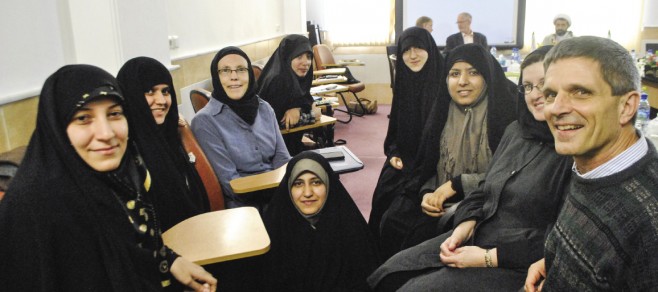
EMU leaders Daryl Byler (right) and Ann Hershberger (center wearing blue) were part of a delegation to Iran in February 2014 that met with women – all scholars at an Islamic seminary – who hope to study at EMU’s Summer Peacebuilding Institute.
J. Daryl Byler’s 11th trip to Iran marks the culmination of nearly a quarter-century of bridge-building efforts between North American Mennonites and Iranians.
Byler, who is executive director of EMU’s Center for Justice and Peacebuilding (CJP), last visited Iran in 2009, before Iran severely restricted visas for visitors from the United States and Canada for an extended period.
With the 2013 election of president Hassan Rouhani and subsequent diplomatic talks between Iran and the West, Iran’s doors have opened again.
Daryl Byler ’79, MA ’85 (religion), was among a 10-member group in Iran from Feb. 19 to Feb. 25, 2014, sponsored by Mennonite Central Committee (MCC). The delegation spent a whirlwind six days in Iran on a tightly managed schedule of workshops, meetings with religious and academic officials, and visits to sites of cultural and religious significance with the purpose of exploring “if this is indeed a new time in which MCC work in a country often perceived as the enemy can and should be reinvigorated or even expanded,” said an MCC press release.
Before becoming executive director of CJP, Byler and his wife Cindy Lehman Byler represented MCC in Palestine and Israel, Iran, Iraq and Jordan from 2007 to 2013.
With only a few days in Iran on this trip, every opportunity to connect and to share with Iranians in face-to-face contacts was potentially precious, beneficial, and rejuvenating to MCC’s goals of promoting “understanding, friendship, and interfaith connections between the people of Iran, Canada, and the U.S.”
The MCC-Iran relationship has been growing and changing since MCC first reached out to Iran after a devastating earthquake in 1990, offering relief supplies in partnership with the Iranian Red Crescent Society. Two more relief efforts followed in 2004 and 2012, as MCC’s outreach has focused and strengthened into “peacebuilding through shared knowledge,” according to an MCC press release.
This work continues in spite of the dissolution of formal diplomatic relations with Iran by both the United States, since the Islamic Revolution in 1979, and Canada, which closed its Tehran embassy and expelled Iranian diplomats from its borders in 2012.
MCC has facilitated and supported many student exchanges, sending American and Canadian students to study in Iran, and Iranian students for advanced studies in Canada and the United States. Ten Iranian students have attended the Summer Peacebuilding Institute (SPI) on EMU’s main campus, and two have gone on to earn their master’s degrees in conflict transformation.
Ten female students from Jami’at al-Zahra are expected to come to SPI this summer. They will be escorted by Dr. Mohammad Shomali, director of the International Institute for Islamic Studies (IIIS) and also director of international affairs at Jami’at al-Zahra, the world’s largest women’s seminary for Shi’a Islam. Shomali’s wife, Mahnaz Heidarpour, will also accompany the group.
During the trip, the delegation visited with three of the 10 Iranian SPI alumni, all of whom are in prominent roles: Mohsen Ghanbari Alanagh (SPI ’11), president of Al-Mustafa Open University; Mohsen Danesh Pajouh (’12), completing his PhD in philosophy of religion; and Seyed Mostafa Daryabari (’13), deputy of education at the International Institute for Islamic Studies.
For Byler, reconnecting with SPI alumni in his new role as CJP director was a special experience, as each of these attendees said they had been deeply affected by the peacebuilding concepts shared at SPI and appreciated exploring the application of these concepts and dialogue in Iran.
Byler says MCC’s return visit to Iran is a “hopeful sign” that the deep foundations of interfaith dialogue and friendship can continue to grow.
Though EMU has regularly hosted students and visiting professors from Iran, the last EMU visitor to Iran was President Loren Swartzendruber, who was part of an MCC-led delegation in October 2008.
– Lauren Jefferson
